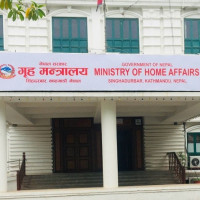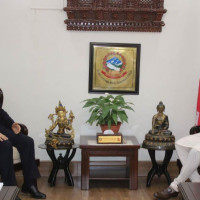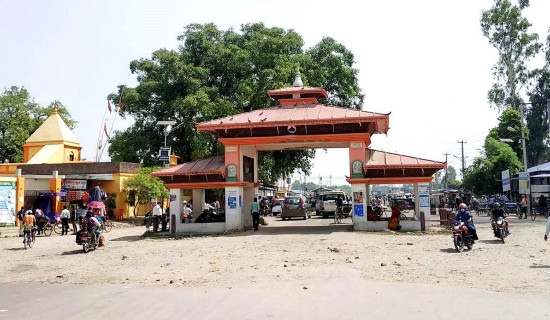- Thursday, 26 February 2026
Civic Competence For Democratic Polity
Mature persons are those who make decisions about life without the help of others. They are daring and liberated from the cognitive seal, material bondage and intoxicating nature of power rooted in the psychology of domination of the weak or Darwinian echo of the survival of the fittest. They are also capable of reflection and self-interpretation as they respond to the human condition and work for its betterment. Immature people, by contrast, are incapable of making rational choices without the regular guidance of others. Their lack of awareness and political skills only amass invalid votes in elections. It marks the primacy of impulse and emotion rather than reason, the gift of democracy.
Democratic politics has provided Nepalis with possibilities and opportunities to engage in the public life of the nation and assume corresponding duties. It has also allowed them to gain experience with democratic ideals and exercise their constitutional rights. Conscious and active participation of Nepalis in politics entails civic aptitude, a vital democratic quality that is crucial to strengthening the efficacy and legitimacy of the polity. Participatory information, skills, experience, courage and wisdom increase their maturity and enable them to exercise the right choice in public affairs, leadership selection and build affinity with political parties, polity and the state.
A sense of inquiry
Nepal’s adoption of the proportional election system has offered the voters to directly elect their representatives and also pick the political party of their choice. It is, however, not a sign of political maturity unless Nepalis evolve a sense of inquiry about the performance of their representatives according to constitutional rules and the public officials responsible for delivering public goods at minimum costs they can effortlessly afford.
Democracy offers valid reasons for the people to seek the prudence of leaders’ action, inaction, or off-beam action and remain satisfied with the function of public institutions and authorities. The way by which attentive Nepalis claim the fulfillment of their rights, establish their primacy, and seek to negotiate their ties with leaders marks the heart of civic fitness. Nepali civic efficacy grows if they build interpersonal trust and become able to organise effective collective action. The bubbling of civic organisations, societies, federations, unions, and societies in Nepali around mutuality and shared values animate the ability of people to unite under common citizenship concerns, build character and civic culture in the nation.
Only then are they capable of transcending personal and group differences and igniting moral awakening to the needs of the wretched and liberate them from enforced silence either through organisational control, disciplinary means, or media manipulation. This requires reforms in the uneven distribution of media attention through equal distribution of information and political knowledge so that Nepalis can make informed choices on vital issues and display their political maturity. If the political maturity of people is weak, leadership and the polity begin to disengage from their concerns producing a segmented and parochial political culture.
Political maturity arises from the nonstop political socialisation of people into Nepali citizens, enabled to acquire experience from political participation and harnessed skill in valid voting, knowledge about local and national issues, different ideologies, institutions, actors, and consciousness about civic duties. Political parties, the Election Commission, media and NGOs also provide voters with necessary information, if not civic education, and help people acquire civic maturity through the superior power of reason. The constitution treats people as sovereign subjects competent to exercise their rights and duties and maturely make decisions. They are capable of learning, acting and judging and, therefore, amenable to the winds of attitude change as per internal needs and transformation in external situations.
Nepalis are increasingly exposed to global media through mobile, telephone, television and the internet, work in various parts of the world and build solidarity with corresponding groups and movements. Awareness about global trends of modernity has increased their demand for increasing the efficiency of institutions, actors and policies. Tension in Nepal exists between an atavistic impulse in elite-driven politics and the universal aspiration of people for freedom, equity and peace. Learning of universal knowledge, language, skills and tools has enabled them to acquire political maturity and even contest many local prejudices and practices of everyday life. Exposure of people to democratic values has fostered their confidence in questioning domination, deprivation and denial of their rights and seeking social opportunities.
Mature people, aligned with public intellectuals, often struggle against the political culture of conformity and democratic deficits induced by primordial forces, operation of special interest groups or transnational forces thus contaminating the distributive regime. Political stability in Nepal hinges on balancing the interests of diverse people, not just party followers, professional classes, or functional groups of society, often ratcheting pressure for the satisfaction of their partial interests.
Active support of political agitation, activism on public issues and a hike in electoral turnout in Nepal indicate corresponding demands of people and increasing the scale of politicisation to convert their grievances into legislative action. Candidates equally develop an emotional attachment to their electoral constituency either directly or through their political agencies —parties, auxiliary front organisations, partisan media, NGOs, civil society and a myriad of intermediary institutions. Leadership success depends on building a bridge between the inputs and outputs of the polity and crafting the responsive capacity of governing institutions to people’s basic material requirements, rights and aspirations, realise the goal of political empowerment and achieving needed success in life.
The political maturity of people is a virtue that helps to create a just society to arrest the societal drift to an irrational direction caused by increasing vices plaguing Nepali society, economy, politics and international relations. Only the fulfillment of the basic condition of life can contribute to the social cohesion of society and national unity. Mature Nepalis are averse to increasing infantilisation of democracy in the nation by paternalistic leaders as democracy provides them freedom, entitlement, and social mobility, not remaining stitched to an appendage of powerful elites often indulged in confrontational politics in the parliament and the streets thus weakening the fragile writ of national polity donned by human rights, social justice and peace.
In this context, Nepali leaders have to atone for their perpetual power lust and control their passion for fame devoid of public accountability and work to build the repertoire of enlightened knowledge necessary for social transformation. Personal contact with the provincial and local elected bodies seems greater in Nepal than the federal ones owing to the large size of constituencies. Similarly, social inclusion is higher in the local bodies than national legislature, notwithstanding the application of a proportional election system. Certain prerogative rights of party presidents, patronage, and the legacy of cronyism have weakened the very purpose of the proportional election system to give representation to persons of distinction, marginalised and backward people.
Similarly, owing to the diversity of Nepali parties, prospects for participation of various groups are far above the ground. There are clusters of small parties in Nepal which are willfully geared to represent minorities of the nation and enthuse in them a sense of ownership and political maturity rooted in the common sense of national tradition and modern civic virtues. For the aspiring leadership, there is a scope to bargain for leadership positions, join new parties, set up their parties, or organise political agitation against the incumbent. But in no way it is a sign of political maturity. Such a tendency does not spur democratic sociability, political institutionalisation and political stability.
Nepali civil society and political culture remain troubled by a lack of political maturity and political wisdom and show poor signs of performance. This is why social and political prejudice, bias, authoritarianism and archaic customs of ties between leaders and followers have not disappeared from social, economic and political life. It has deep psychological effects on building a free society that can bridge the separation of people from the operation of law and nurture a sense of community.
Radius of trust
One reason is the radius of trust orbits around the circles of family, kinship, relatives, friends, region, ethnicity, etc., not impersonal public institutions. This has helped Nepali leaders to personalise parties and indulge in the ascriptive recruitment of executive heads in constitutional and public bodies. Even social networks, associations and solidarity are built to cater to the interest of sectoral groups rather than the general Nepali public. A low-trust society breeds sectarian and communal tendencies and creates a gulf across the national divides. A fragile deal at the top is often contested by critical mass. Attentive Nepalis are keeping necessary democratic vigilance on the operation of political and economic power which is a sign of their political maturity.
A mature society asserts the associative power of people to exert pressure on elite politicians and makes them confirm the principles of the constitution. Mature minds are always rational because they not only long for the utility-maximisation of their action but also possess scientific and humanistic sensibility, make effectual compromises, seek harmony, peace and justice in society by unremitting renewal of politics, leadership and institutions so that non-functioning parts are either reformed or replaced by the new ones. This is the way to protect the democratic way of life of Nepalis beyond the ideological clichés of the left, the right and the centere whose utility has now become obsolete.
(Former Reader at the Department of Political Science, TU, Dahal writes on political and social issues.)















